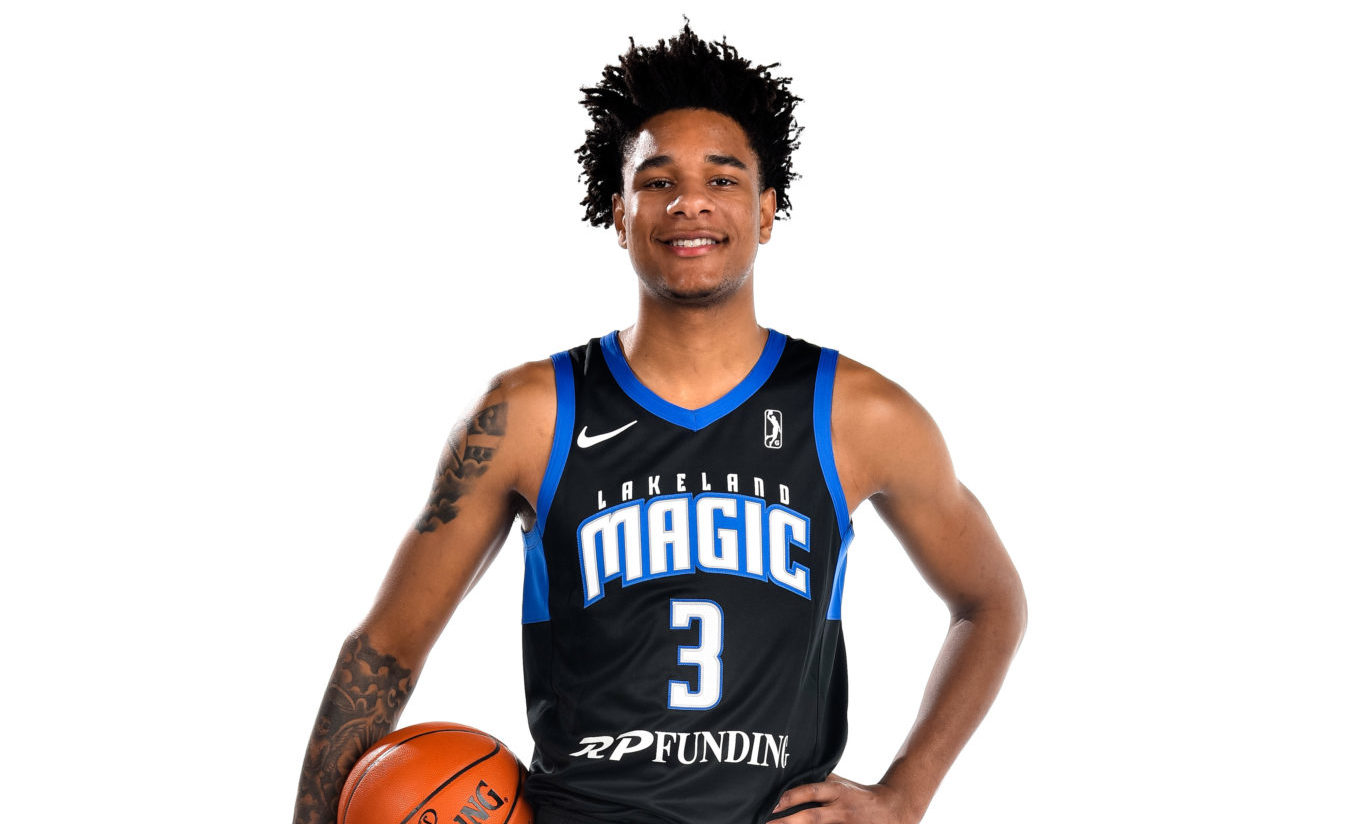
From March Madness to NBA, Chuma Okeke’s Road to Recovery is Almost Complete
For the basketball world at large, the postponement of the 2019-20 NBA season and the cancellation of the NCAA tournament in the wake of the coronavirus came as shocks to the system. That’s particularly true for the first weekend of April, which is normally dominated by the Final Four, ahead of pro basketball’s playoffs.
For Chuma Okeke, life without competitive hoops, amid relative isolation, has been his reality since last year’s edition of March Madness.
It was a simple slip screen, a play Chuma had run hundreds of times in his basketball career without issue.
But this time was different.
This time, he was in a world of hurt.
The sophomore forward was dominating in the Sweet Sixteen of the 2019 NCAA tournament at the Sprint Center in Kansas City. His 20 points, 11 rebounds and five three-pointers put the Auburn Tigers on the verge of another upset victory—this time over the No. 1 seed North Carolina Tar Heels.
But with 8:08 remaining in the second half, on that fateful Friday during March Madness, Chuma’s left knee buckled and he hit the floor with a harsh thud. The whole arena went quiet, the sound of his agony filling the vacuum.
“I felt a loud pop. It was so painful,” he tells CloseUp360. “I thought the bone came out, but then I looked down and my leg was still a part of my body, so it was something to be thankful for.”
Chuma’s head filled up with questions.
Why me? Why now, with my team so close to a championship? Will I ever play again?
“Lots of stuff,” he says. “Lots of emotion.”
Chuma’s mother, Renee, knew what her son was thinking. The moment Chuma went down, she got up from her seat and hurried her way from the bleachers to the floor to comfort him.
“I knew he was hurt bad,” she says. “I was just hoping that it wasn’t an ACL tear, but I told him that we love him and don’t worry about anything because it’s just a minor setback. God’s got this and it’s going to be okay.”
Chuma has watched and re-watched video clips of the incident in the months since it happened. These days, he is able to reflect on the devastation with an optimistic outlook. He suffered a torn ACL, but received surgery from the renowned Dr. James Andrews—who’s based in Alabama and called Auburn about treating Chuma before the school called him—which set him on the road to recovery.
“That already eased my nerves because [Dr. Andrews] had so many athletes come through and get surgery,” Chuma says. “They came back and had successful careers.”
Chuma’s rehab has been grueling at times, but he was still able to fulfill his childhood dream by getting drafted. The Orlando Magic took the 21-year-old with the No. 16 pick in the 2019 NBA draft.
Instead of signing a standard rookie contract, Chuma inked a one-year deal with the team’s G League squad in Lakeland, Florida—a medical redshirt of sorts. He is not expected to return until summer league play begins, or if it happens at all, pending the postponement of the NBA schedule.
With the Lakeland Magic, Chuma had been doing about an hour of rehab in the mornings before running and shooting.
“It’s been up and down,” he says. “Going through rehab isn’t fun, but it teaches you to be patient during the process. Because that’s really all it’s about—patience.
“But other than that, it’s been a blessing because I’ve been able to get stronger. Everything’s been good.”
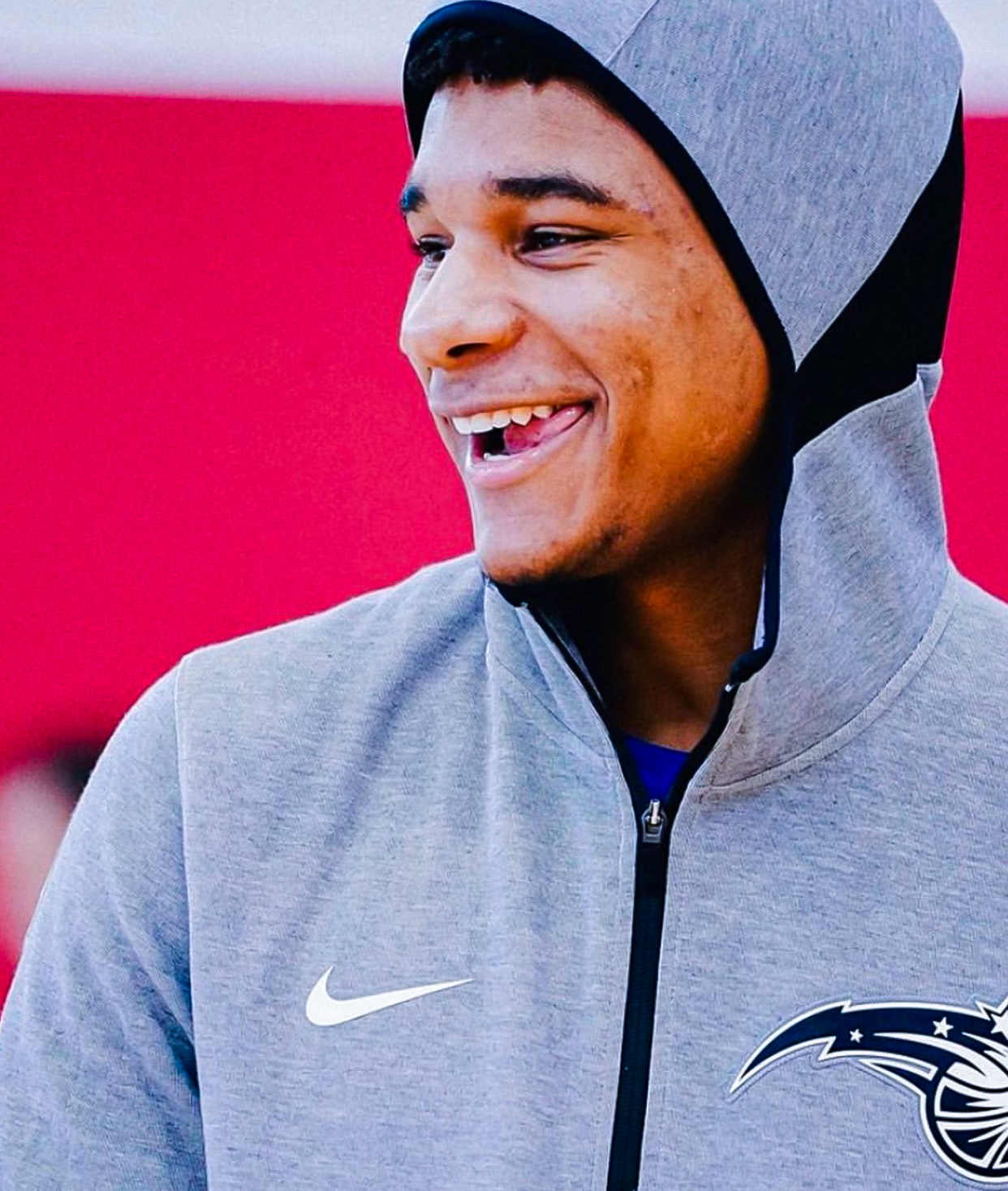
The Orlando Magic selected Chuma Okeke with the No. 16 pick in the 2019 NBA draft, even though he was coming off an ACL injury. (Courtesy of Renee Okeke)
As a kid, Chuma was reserved, even shy at times. But as an athlete—whether balling on the court or sprinting across the field in football-crazed Georgia—he portrayed a much louder persona.
Hence the nickname “Quiet Storm.”
“People would see me play and the way I would perform,” he says. “They wouldn’t think I was this quiet.”
Chuma showed promise in basketball long before becoming a 6’8”, two-way star who rooted for LeBron James, but identified with Kawhi Leonard.
Chuma first set foot in a gym at the age of two, when Renee took him with her to a local rec center to register his older brother, Chuka, for basketball. Two years later, she took Chuma back there, this time to plead with the recreation director to let her younger son compete. She’d grown up playing the sport herself in Linden, New Jersey, and knew that it would be a good way to both boost her children’s development and occupy their free time.
Chuma, for his part, already knew how to dribble and shoot by then.
“Look: he’s tall, he’s big, he’s been in the gym watching his brother play,” Renee said. “Can he play at age four? He can do this. He can play against the older kids.”
The director relented and let little Chuma participate in organized basketball. With his precocious skills, he fared well enough that, at the age of eight, he started playing AAU hoops. Once he reached sixth grade, he began dominating middle school competition, in what Renee calls a “unique way.”
“He always tried to include every teammate while on the court,” she explains. “He believed in inclusion. In return, they were confident knowing Chuma could score, pass, rebound and had a coach’s eye of the game.”

Chuma played AAU ball with the Georgia Stars. (Courtesy of Renee Okeke)
Chuma’s true quantum leap, though, came in high school. For all of his talents as a passer, ball-handler and rebounder, he hadn’t quite come into his own as a scorer. After his freshman year at Langston Hughes High School, just outside of Atlanta, his coach, Rory Welsh, told him that he needed to step up and average 20 points per game for the team to have success.
“I was thinking, You’re crazy. I’m not gonna score 20 points per game,” Chuma says. “But he saw something in me that I didn’t even see in myself.”
With coach Welsh’s conviction in his head and his trainer, Mark Hayward, in his ear, Chuma spent the summer of 2014 transforming his game.
“Next thing you know, the game came and I just started scoring 20 and the game became kind of easy,” Chuma says, “just because of the work I was putting in. I was just surprised because even the season before, it was hard to do those things.
“That’s when I thought I could be really good.”
With that extra effort, Chuma became a star as a sophomore before transferring to powerhouse rival Westlake High School for his junior year—much to the dismay of coach Welsh.
“He said, ‘Mrs. Okeke, you just don’t know the effect Chuma has on this team,’” Renee recalls. “He said, ‘When the guys are waiting to start practice, they’re just shooting and everything. But when Chuma walks in that gym, everybody comes alive and gets excited.’
“And I was, like, ‘Wow, I didn’t know he had that kind of effect on his high school basketball team.’”
The coaches and players at Westlake soon saw for themselves what an impact Chuma could have. As a junior, he led the Lions to the Georgia Class 6A state championship, with 13 points in a 68-58 win over Collin Sexton’s Pebblebrook High School squad. As a senior, Chuma averaged 24.4 points, 15 rebounds and 2.4 steals, winning Mr. Georgia Basketball and beating out Wendell Carter Jr., his close friend, for the prestigious honor.
“Chuma was a multi-faceted player,” Renee says. “Couldn’t nobody touch him. He could play all the positions.”
By then, Chuma had already attracted a swell of attention from college coaches. He first popped on to the recruiting radar during the summer of 2015, when he, Wendell and future Auburn teammate Jared Harper led the Georgia Stars AAU team to the Nike EYBL Peach Jam title in North Augusta, South Carolina.
From there, the calls and letters rolled in, even more so once Chuma established himself at Westlake. All told, roughly 50 colleges and universities recruited him. With so many coaches coming to check him out, he often deferred to his teammates during games so that they, too, could garner scholarship offers.
“I was already getting looked at and already knew what I was capable of,” he says, “but my teammates were also capable players, so I just wanted them to get looked at. And they were coming from the same place I was—overlooked, just like I was.”
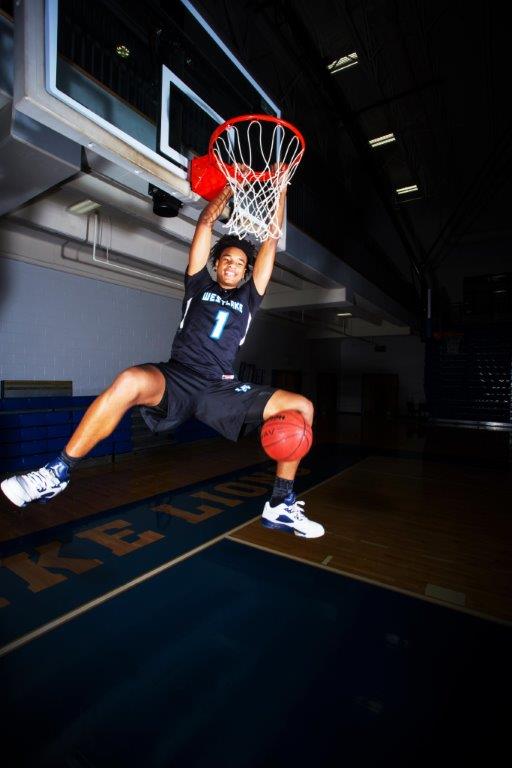
Chuma finished his prep career as Mr. Georgia Basketball at Westlake High School. (Courtesy of Renee Okeke)
Of all the coaches who came to court Chuma, Auburn’s Bruce Pearl made the strongest impression—on him and Renee. Bruce wouldn’t guarantee Chuma a starting spot from the jump. The coach said he’d have to work for it.
Chuma appreciated that honesty. So did Renee, who demanded that her three kids never miss a single game or practice.
Auburn was also close enough to Atlanta that Chuma could take a short flight home, but far enough that he couldn’t easily drive back at the first sign of trouble. It proved to be a perfect match.
Former Auburn assistant coach Chuck Person, who was known as “The Rifleman” in the NBA, was instrumental in fixing Chuma’s three-point shot. With that added range, he raised his scoring average from 7.5 points as a freshman to 12 points as a sophomore, while shooting nearly 40 percent from beyond the arc.
In the 2019 NCAA tournament, Chuma averaged 15 points, seven rebounds, three steals and 2.3 assists. As critical as he was to Auburn on the court, his spirit served as an inspiration to his teammates, even after his injury.
Before the Tigers left the team hotel for their Elite Eight matchup against Kentucky, the coaches asked Chuma if he would be coming with them to the Sprint Center to watch the game. For Chuma, the pain—both physical and emotional, which had kept him up all night—would be too much to bear in that setting, so he declined, opting instead to observe on TV from his hotel room. He later texted his teammates to inform them that he wouldn’t be there to cheer them on.
At the Sprint Center, Chuma’s team did its part to honor him. One of his teammates, Malik Dunbar, wore Chuma’s No. 5 jersey during warmups. Others wrote Chuma’s initials and number on their own gear. The team left a locker open for him, as if he might show up to save them.
Which, in a way, he did.
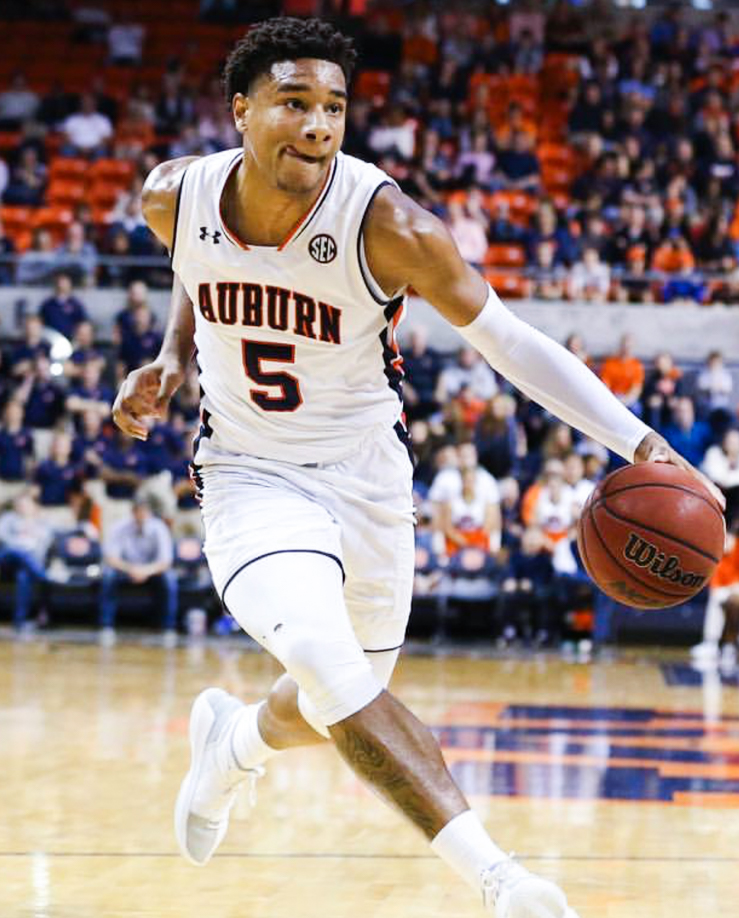
Chuma averaged 15 points, seven rebounds, three steals and 2.3 assists during the 2019 NCAA tournament. (Courtesy of Renee Okeke)
Back at the hotel, Chuma’s attitude had shifted as soon as the game came on. Despite his discomfort, he felt compelled to support his team in person.
But transporting someone of Chuma’s size, in a wheelchair, to the arena in time to catch the end of the game would be no easy feat. At first, Chuka thought to order an Uber. But with so many complicating factors, the Okekes quickly realized they would need more help than that.
So they called Clark Pearson, Auburn’s athletic trainer, who pleaded with a police officer in the arena to send an escort for Chuma and his family. The cops obliged, shuttling the Okekes through a closed road in downtown Kansas City to the arena.
With his mother and brother by his side, and Auburn compliance director Rich McGlynn pushing him from behind, Chuma was wheeled into the arena during a timeout early in the second half. The crowd showered him with chants of “Chuma! Chuma!” and his teammates surrounded him as he settled in behind the Auburn bench.
He arrived just as the Tigers had strung together a 12-2 run to take a 40-37 lead over the Wildcats.
Chuma’s pain persisted, but the impact of his presence was unmistakable. Auburn went on to beat its SEC rival, 77-71, to earn the school’s first-ever Final Four berth.
Despite his absence from that game, Chuma was named to the Midwest Regional’s all-tournament team. He was also among the first Tigers to hoist the Midwest Regional trophy, and did the honor of pasting Auburn’s name on to the Final Four bracket at center court, with a piece of freshly cut net hanging around his neck.
Two days later, while his teammates were in Auburn preparing for their matchup against top-seeded Virginia, Chuma was in Florida undergoing surgery on his knee.
Shortly thereafter, Chuma began his grueling two-a-day rehab sessions at Auburn. He would work on his quads, grind through sets of calf raises, walk in the pool and on an elliptical, and run on the AlterG Anti-Gravity Treadmill.
The hardest part of all: bending his knees.
“It’s probably the most painful thing I ever felt,” he says. “But it was something I had to go through.”
The Okeke household in greater Atlanta was full of nerves on June 20, 2019. That day, while surrounded by 30-40 guests, Chuma and his family would learn his professional fate in the NBA draft.
Despite his injury, Chuma opted to leave Auburn with two years of NCAA eligibility remaining.
“I was encouraged to still ‘test the waters,’ and when I did submit my name to test the waters, I was amazed by the interest I received from NBA teams,” he explains. “I knew then, I had to focus 100 percent on working towards my rehab recovery. I also knew I’d always have a home at Auburn to finish my degree in the future.”
Chuma couldn’t work out during the pre-draft process, but wound up traveling to interview with 10 NBA teams anyway.
“It also gave me a chance to see what things I needed to work on,” he says.
Even with that interest (not to mention Renee’s encouragement to go to New York, where she was born), Chuma elected not to attend the draft at Barclays Center in Brooklyn. He knew teams were interested—including Orlando—but was uncertain of where he’d end up.
Chuma was no less nervous at home, where his mom had hurriedly arranged a party for family and friends, including her son’s closest confidants. He didn’t know if his name would get called, and didn’t want to disappoint those who had come out to celebrate.
Then, just as the lottery portion of the draft was ending, Chuma got a call from his agents, Dave Spahn and Richard Beda of CAA Sports. The Magic were going to take him at No. 16.
It may not have been the lottery—as it probably would’ve been if he was healthy—but it was close enough.
“It was a relief,” Chuma says. “I’m not sure how happy I was, but I was very excited to be picked, especially being injured, and picked by the team I really wanted to go to at the same time, because I have family up here. And it’s just a good environment up here.”
“Everybody just jumped up simultaneously and said, ‘Yay!’” Renee recalls.
Chuma quickly bought into the idea of a medical redshirt year. He trusted that the front office and training staff in Orlando would do right by him in an effort to get him back healthy.
So far, so good.
“I trust everyone,” he says. “They’re professionals, so I’m always going to trust in them because they know what’s best for me. And I feel like this was the best thing because of how I’m feeling now, how I’m stronger.”
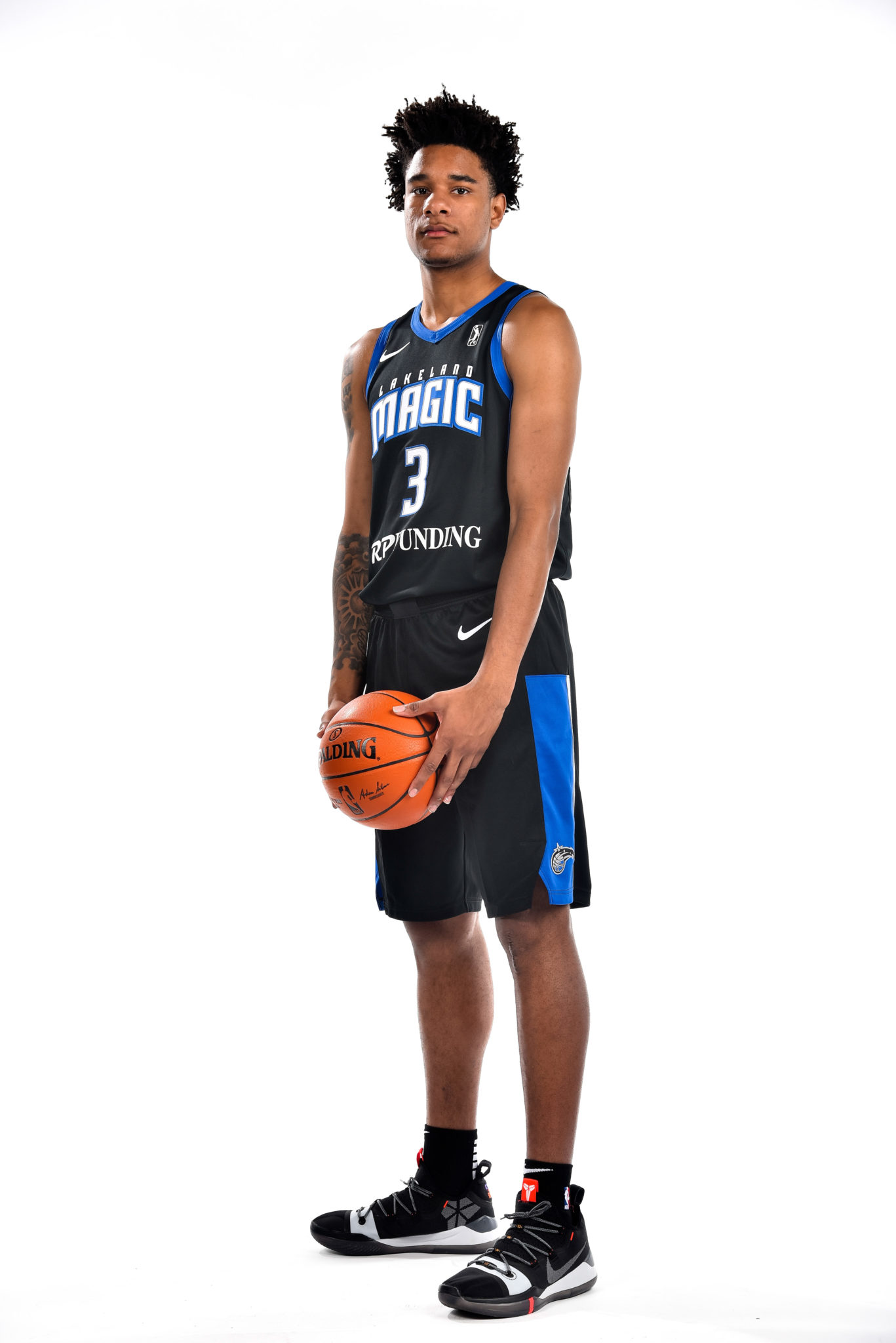
Chuma spent the 2019-20 season rehabbing with the Orlando Magic's G League affiliate in Lakeland, Florida. (Fernando Medina/NBAE via Getty Images)
The slow pace of life in Lakeland has fit well with Chuma’s personality. He isn’t a partier. He isn’t a drinker. He just loves basketball. When he isn’t on the court, he can be found at the movies, hanging out with his teammates or playing video games—NBA2K and Fortnite, in particular. He also likes to rap, and is using some of that to stay motivated during his rehab.
“I enjoy rapping and I do it for fun,” he says. “However, I do have quite a few really good recorded songs in my music library. I’ll probably release them soon.”
Chuma’s life will almost certainly get more hectic if everything goes according to plan. He expects to be with the Magic next season, criss-crossing the country over the course of an 82-game schedule.
In the meantime, Chuma is staying diligent with his rehab. He started with two-a-days, every day of the week, but quickly transitioned to one daily session.
“My legs are getting stronger and everything’s been good,” he says.
Chuma had been a steady presence around the Lakeland Magic, watching the team compete at home and traveling on the road. That helped to keep his mind in the game and his heart happy around the sport he loves.
“He’s in really good spirits, he really is” says Renee, who visited her son once a month in Lakeland while the season was still going.
Chuma had been working on his three-point shot, too, to make sure it would be ready when the time comes to play again.
“I wouldn’t say I’m too eager,” he says. “I’m always just, like, ‘Let’s get back on the court,’ but it’s not like I’m trying to rush anything at the same time.”
Chuma is also glad to have his mother in his corner. He grew up watching her work at a paper company and fill in as a substitute teacher to provide for him, his brother and his sister, Shelby.
“She’s where I get my work ethic from, with how hard she worked,” Chuma says. “You would see her and not even know she’s going through anything. And that’s probably where I get not showing my emotions.
“I just want to play, get better and make a better life for everybody in my family—including myself.”
It’s been quite a journey already. Just over a year after the injury, Chuma’s knee is healthy and he’s doing what he can to get back into playing shape while under lockdown in Florida. He hopes that going through these trials and tribulations will result in something special, whenever the basketball world starts turning again.
“Just thinking about where we came from and how hard it was, I’m always going to have that motivation, that chip on my shoulder,” he says. “The rehab process is easier for me because I know I can’t give up. It’s just another obstacle. I’m patient. We all have obstacles in our lives and I feel like we’ve never looked back at any previous obstacles that could slow us down.
“Once we get through this, we’re going to look back at it just like I’m looking back now. All the rehab sessions I did, it’s going to make me really, really happy when I finally get to play in the NBA.”
Mike Mazzeo is a veteran NBA writer based in New York City. Follow him on Twitter.
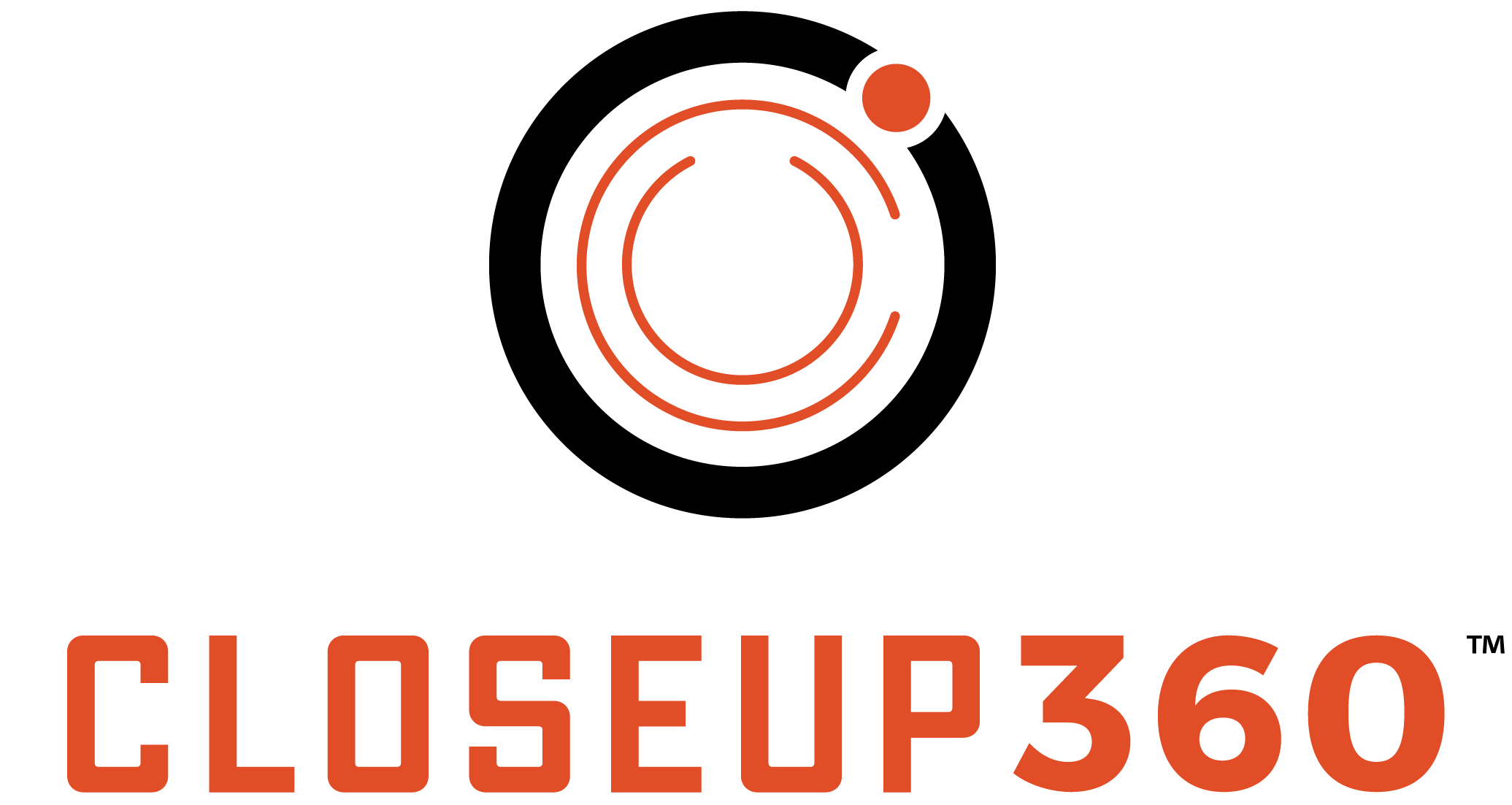
Instagram
Twitter
Error: Could not authenticate you.
Facebook
Subscribe